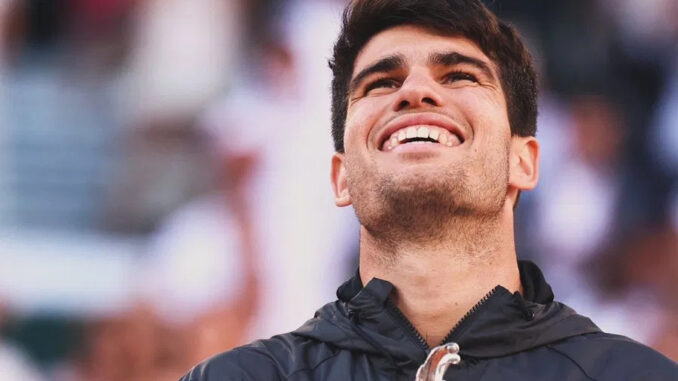
In the whirlwind of professional tennis, where every forehand and serve can alter a player’s destiny, Carlos Alcaraz stands as a beacon of youthful brilliance. At just 21, the Spaniard has already etched his name into the sport’s history books, claiming four Grand Slam titles and a former world No. 1 ranking. But behind the dazzling rallies and trophy hoists lies a story of quiet guidance, one that Alcaraz recently shared with a rare vulnerability. In a heartfelt conversation ahead of his upcoming Netflix docuseries, set to premiere in 2025, the Murcia native peeled back the layers of his journey, revealing the profound influence of two men who’ve shaped him into the champion—and the person—he is today: his father, Carlos Alcaraz González, and his coach, Juan Carlos Ferrero.
Alcaraz’s tennis odyssey began at age four, swinging a racket at the Real Sociedad Club de Campo de Murcia, where his father served as a coach and administrator. Carlos Sr., once a top-40 player in Spain before financial hurdles halted his dreams, could have easily taken the reins as his son’s primary coach. Yet, in a choice that speaks volumes about his character, he stepped back, choosing instead to nurture his son’s love for the game from a distance. “He never stepped on the court when I was with my coaches,” Alcaraz recalled, his voice tinged with gratitude. “Behind the scenes, he always talked to them about what I needed to practice, but never directly to me. He wanted to respect the role of the father.” This deliberate separation, Alcaraz believes, was a gift. “A lot of fathers don’t know how to be—let’s say, a father or a coach,” he added. “Keeping those roles separate helped me a lot.”
That restraint allowed other mentors to step in, most notably Ferrero, a former world No. 1 whose own clay-court mastery at Roland Garros in 2003 foreshadowed Alcaraz’s triumphs. Ferrero entered Alcaraz’s life when the prodigy was just 15, a wide-eyed teenager with raw talent but unpolished discipline. Under Ferrero’s wing at his Villena academy, Alcaraz transformed into a force, becoming the youngest ATP world No. 1 at 19 after his 2022 US Open win. “He’s tough,” Alcaraz said of Ferrero, chuckling at the memory of their early days. “Very serious when it comes to work and discipline, he’s hard on you. But he’s also very funny when the moment calls for it. He knows how to balance it perfectly.” This duality—demanding yet supportive—has been a cornerstone of their bond, one so deep that Alcaraz now calls Ferrero a “second father.”
Their partnership, now bolstered by new coach Samuel Lopez, isn’t just about technique or strategy; it’s about values. Ferrero’s guidance has instilled in Alcaraz a humility that shines through, whether he’s signing autographs for fans or opening doors for tournament staff. Spanish pro Roberto Bautista Agut once praised Ferrero’s role, noting he’s “doing a phenomenal job guiding him because he’s been through the same thing.” For Alcaraz, Ferrero’s lived experience as a champion offers a roadmap through the pressures of stardom, a path his father helped pave by staying in the background.
Carlos Sr.’s influence, though less visible, is no less vital. A constant presence at tournaments, he’s the steady hand that keeps Alcaraz grounded, reminding him that family—not rankings—defines him. “When I finish a tournament, it doesn’t matter if I win or not, I just want to get home to be with them,” Alcaraz has said, a sentiment that echoes his father’s emphasis on perspective. This balance has carried him through a 2025 season of highs and lows: a Rotterdam title, a crushing Australian Open quarter-final loss to Novak Djokovic, and a shocking Miami Open defeat to David Goffin. Yet, as he prepares for the Monte Carlo Masters, where he’s tweaking his racket and serve for clay’s demands, Alcaraz carries the lessons of both men—discipline from Ferrero, heart from his father.
The upcoming docuseries promises to delve deeper into this dynamic, offering fans a glimpse of the “Carlitos” behind the headlines—a kid from El Palmar who dreams big but stays tethered to his roots. As he navigates the clay season, chasing a second Roland Garros crown, Alcaraz’s story is a reminder that greatness isn’t forged alone. It’s built on the quiet sacrifices of those who know when to lead—and when to let go.
Leave a Reply